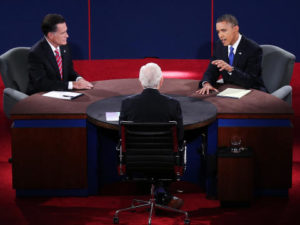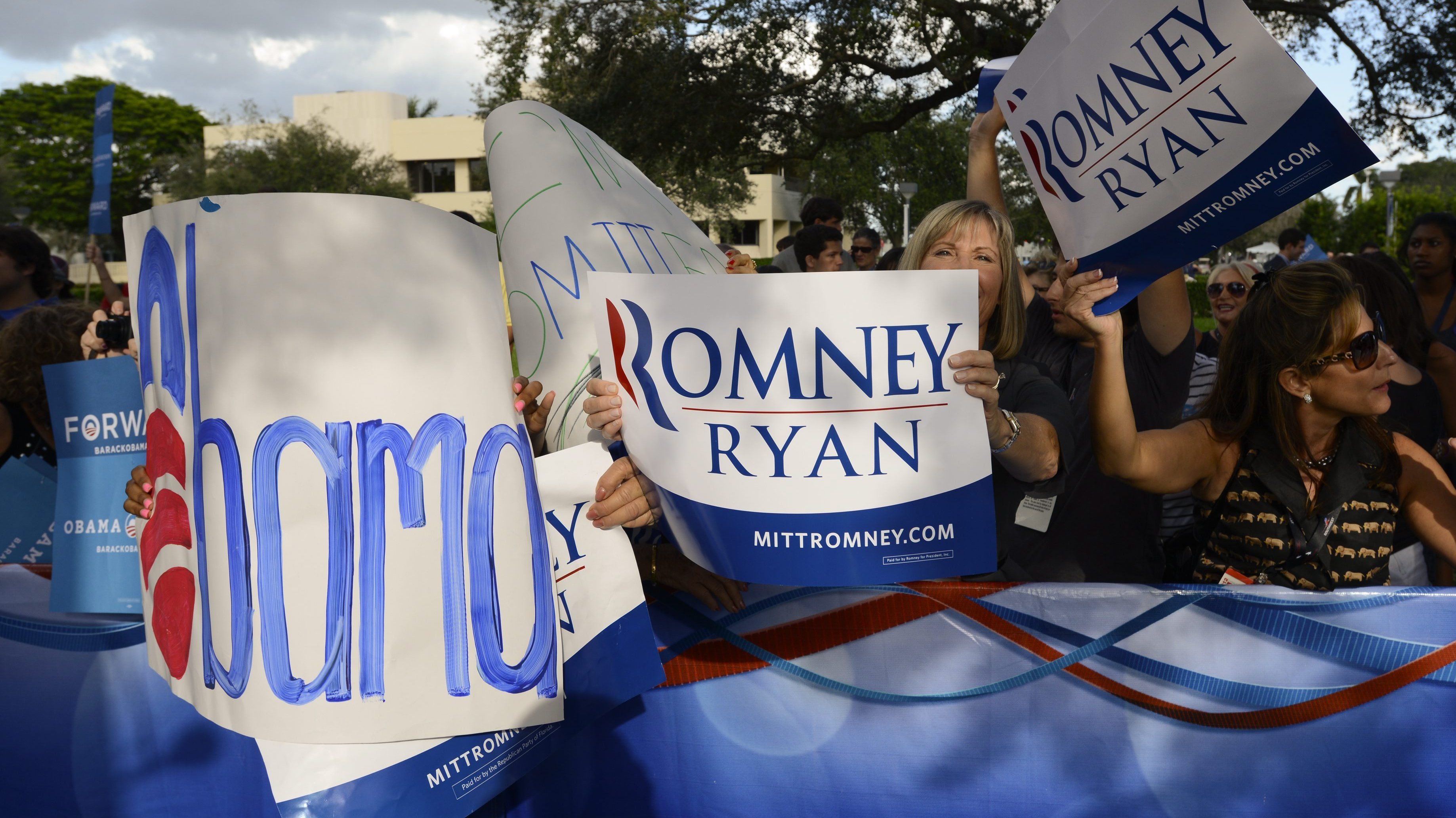(The Verge) — If there’s one thing we lost since the last presidential debate, it was the energy. We went from a tense, passionate town hall debate in Long Island to a calm, cool and collective discussion in Boca Raton, Florida. The subject was foreign policy and Bob Schieffer, host of Face the Nation, moderated the debate. There were various moments where the candidates sharply disagreed, especially in talks about Libya, Israeli relations and potentially-nuclear Iran. Because each candidate was sitting down, similar to the vice-presidential debate, I think the tone was a bit more laid back than the town hall debate, and ultimately, more policy was discussed.
When Schieffer brought up topics about the Benghazi incident, the Syrian civil war, and turmoil in Egypt, Mitt Romney discussed his intentions with the countries, and being aggressive with the Islamic extremists, but then (almost every time) turned the conversation back to weaknesses within the U.S. economy. I’m convinced that the Romney debate prep team told Mitt to infuse the ideals of economic revitalization in the minds of the voters, even when topics of foreign intervention were brought up. I’m also somewhat surprised the Benghazi debate did not escalate more than it did…considering the tensions that flared in Long Island last week!

Not only did the Romney debate team tell him to tone it down (from the town hall debate), but I think President Obama was in the same boat. They each appeared way too flustered and aggressive in the last debate, so in this one, at the table sit-down, they maintained their composure and attempted to listen to one another.
But President Obama naturally did seem to be on defense (regarding the economy) throughout the evening. In my belief, he did also justify his actions in foreign policy throughout the last four years. At a few defensive points regarding his stances abroad though, he had to prove he made no “apology tour” throughout the Middle East for the United States’ dictation, and aggression in the area and use of torture. He also was forced to show that his relationship with Israel was in fact present and thriving.
President Obama criticized Romney’s thoughts on the deficit and military spending, saying that his numbers just don’t add up. He said Romney cannot successfully reduce the deficit while also increasing military spending. He even brought up how ‘sure, we’ve got less numbers of horses and bayonets too’…which I believe tried to clarify his stance on selective military spending reductions (i.e. amounts of Naval ships). The President also seemed a little too condescending while he attempted to teach Mitt Romney about how air planes land aboard aircraft carriers…
While all of these disagreements took place, I also think the tone of this debate was a bit different from the others because each candidate seemed to agree with the other in more than a couple of situations. Because foreign policy is such a touchy subject, and contradicting one another in matters of national security and military strength would make them appear weak or unknowledgeable, they came to some similar conclusions. Some of these (vague) agreements included the Bin Laden operation, sanctions on Iran, having a smooth transition of the Assad government in Syria, and attempting to mend our relationships with Israel and China as a “partner.”
While each man said that clearly there are some things that need to be patched up, they also had sharp disagreements on matters of China and Israel, and these, I believe were the highlights of last night’s debate.
Mitt Romney immediately claimed that on Day 1 of his presidency, he would declare China as a “currency manipulator,” because they have time and time again stolen our intellectual property and counterfeited our products. Schieffer pitched in at this point, asking whether this measure would create a trade war. Romney disagreed, saying the US needs to be stern with China, not allowing them to take advantage of us, but all the while keeping them as a trade partner. President Obama on the other hand, got quite political on the issue, eventually bringing up how Romney had investments in foreign companies in China, and saying that outsourcing jobs in America (like Romney did) does not prove to be a good credential for an American president. Each man agreed however,that China remains a sticky situation, especially as it exports so many goods to our nation every year.
As far as Israel goes, Mitt Romney had a shining moment when he said, on the President’s Middle Eastern tour, he just happened to forget Israel.

This (to me), implied that our relationship with Israel really is quite strained, helped by the fact that the President shies away from dealing with Prime Minister Netanyahu all the while war remains a possibility. He said that the American people noticed that this relationship has gotten nearly hopeless. Israel is supposed to be one of America’s greatest allies, but when the President claims that he wants to ‘put space between the US and Israel,’ it doesn’t make Americans comfortable. Romney exclaimed that as President, he would have a good relationship with Israelis, to the point where he would know a while beforehand that Israel had started a war with Iran because he will have been chatting with Netanyahu and coming up with a strategic plan, which at all costs would try to refrain from war.
As far as a shining moment goes for the President, I believe this came when he tried countlessly to accuse the Governor of flip-flopping on issues throughout his campaign. He said that Romney has changed stances on intervention in the Middle East, and how the Bin Laden operation should have gone, etc. He said that Romney didn’t want to “move heaven and earth to catch one man” (Bin Laden) whereas now he claims to approve of such aggression with the dealings of the terrorist leader.
Just from an outsider’s perspective, it was hard to tell who had won this debate. It actually reminded me of the 2000 vice presidential debate, where sitting down, both Dick Cheney and Joe Lieberman pledged to ‘keep it clean.’ This older debate, as some would say, also proved to be quite boring and non-influential. As far as tonight, the tone of the debate was very lackadaisical and although there were some moments of tension, it seemed more like a forced reconciliation on the playground for little kids…each tried to seem professional and accepting of the other’s views. This for me, is not as entertaining as an intense debate, but given the subject and the war on terror, and our economic turmoil, there really is no room to be childish and point fingers. If I had to choose a winner though, I’d have to go with the Governor. He just seemed more presidential and composed, whereas the President seemed angry and somewhat aggravated at points. But in general, I think the Governor could’ve touched on a few more issues of importance (i.e. Libya), and Obama lucked out in that he didn’t have to deal with a heated, accusation-driven Romney.
(Early CNN polls on the debate also said the President won overall, (with 48% of the vote), meanwhile Romney took 40% but held an advantage amongst males and passed the commander-in-chief-test.)
This debate was quite rewarding for me as well…because I received my fifteen minutes of fame being interviewed on My9 regarding my thoughts about the evening!
New Jersey’s Home | News, Weather, Sports | WWORTV | My9




